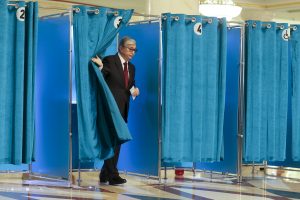When Kazakhstan’s ruling party, Nur Otan, obtained 71 percent of the vote in the January 10 parliamentary elections, nobody seemed surprised. Kazakhstan is still firmly ruled by the same Nazarbayev-centric elite that has dominated the past three decades. Nursultan Nazarbayev, the leader of Kazakhstan for almost 30 years until his resignation in 2019, continues to be the country’s top decision-maker.
Nur Otan is Nazarbayev’s personal party. It is so personal that he is the president of the party and the “Nur” part of the party’s logo was, until recently, a replica of his signature. The party has not lost an election since its formation in 1999.
New legislation regarding the election of deputies gave political leaders full control of the party lists, depriving voters of the possibility to choose their favorite candidates.
It is no surprise that people’s excitement for the election was low.
“I heard there are elections today. But for what?” a friend in Almaty asked, adding that she had no interest in going to the polls for what she thought was going to be “the same old circus.”
Despite Kazakhstan holding elections regularly, the organizations and faces that end up forming the parliamentary roster and the government seldom change.
In the past three years a few alternative and opposition movements have emerged. The Democratic Choice of Kazakhstan (DVK) was revived by its founder, fugitive banker Mukhtar Ablyazov, after he was released from a French prison in late 2016. In October 2019, opposition journalist Zhanbolat Mamai founded the Democratic Party (DP), a nationalist party that often uses anti-corruption slogans similar to the DVK. A protest during the Almaty marathon in April 2019 brewed discontent among a younger crowd that grew to become Oyan, Qazaqstan! (OQ), a movement that was the protagonist of several subsequent public rallies.
Yet the dozens of activists that sometimes take to the streets represent no threat to the government, which routinely responds with hundreds, if not thousands, of police, special security forces, and plain-clothed KGB agents to face off with protesters. Preventive arrests were used extensively before and after Kassym-Jomart Tokayev replaced Nazarbayev as president in 2019, continuously hindering the growth of opposition organizations.
Vyacheslav Abramov, editor of Vlast.kz, one of the most respected news outlets in the country, wrote that the elections were akin to an illusion. Taking Abramov’s argument further, the 2021 elections were a primer on three illusions that have characterized the so-called “post-Nazarbayev” era. Although we have repeatedly heard and read the words transition, competition, and pluralism, these have remained little but empty slogans.

































